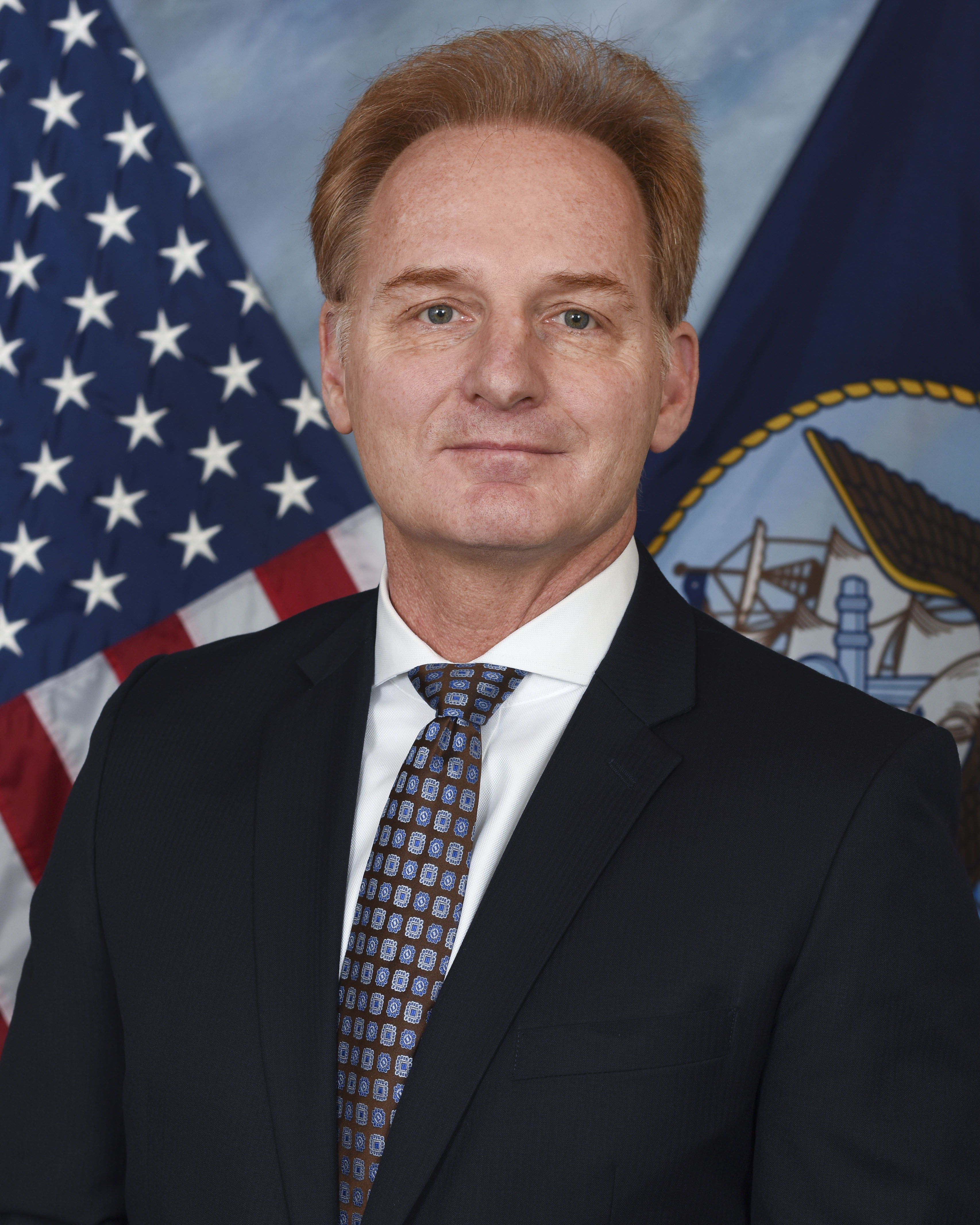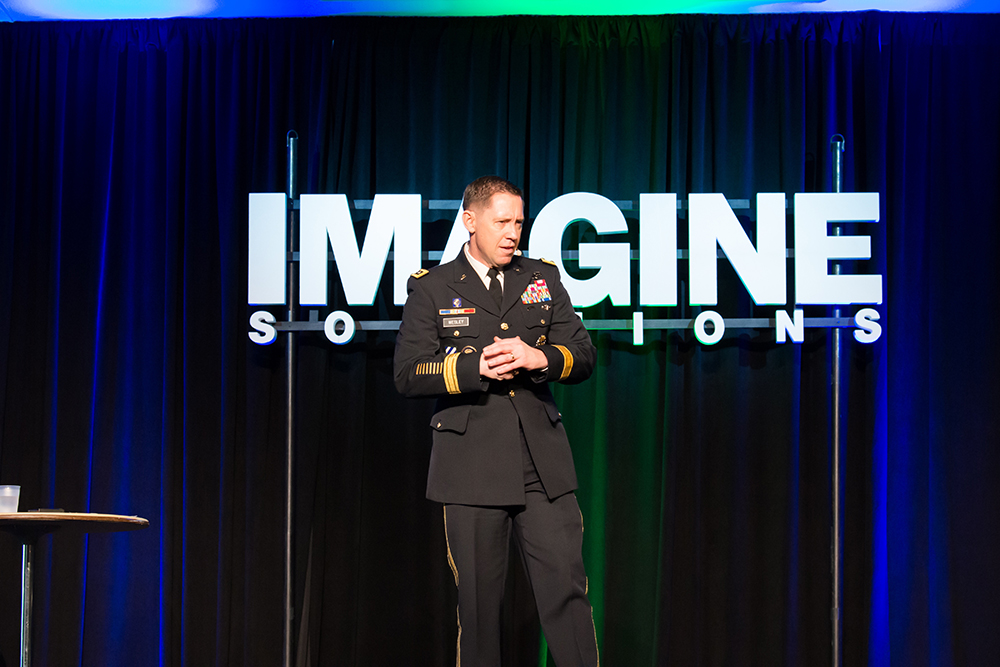An Evolving Navy for an Evolving World
United States Navy Undersecretary Thomas Modly speaks thoughtfully about the operational challenges facing the Navy to maintain its competitive status, including primary resources like enough ships to accommodate current mission demand, insufficient procedures for acquisitions and business operations, staggeringly escalating costs, strain on the forces, and new cyber and space fronts. The Navy is an organization consisting of over a million people, requiring significantly streamlined systems in the future. Our peer countries are redefining the way the military, mercantilism, and technology need to be considered globally. The imperative is urgent and transformative change.
00.03
good afternoon fantastic in 2008 President Putin's Russian military conducted an incursion into the former Soviet state of Georgia and by all accounts that operation was a failure and their performance abysmal after withdrawing President Putin brought his equivalent of an interagency together in Moscow and he said we will fix our army six short years later Russia annexed Crimea without firing a shot and then about six eight months later they conducted an incursion into eastern Ukraine and by all accounts the
01.02
problems that they experienced in the former Soviet Georgia their ability to conduct intelligence their ability to conduct logistics ground combat operations and integration of air and ground had all been fixed a year later in 2015 Russia simultaneously conducts expeditionary operations into Syria and by all accounts were able to sustain both at the same time Russia to this day in fact if you look just two months ago you may have read that there was an incursion or rather a conflict between the ukrainian navy in the sea of his eyes and days later National Public Radio asked the question did they just annex the Sea of Azov ladies and gentlemen my point to you is the world has changed it's changed in a
02.02
fundamental way our intelligence report would say that of ten major capabilities that we will need in the next major war for the army that of six of them Russia will exceed our capabilities we'll have parity in three and we will dominate one in ten years the world has changed and it's not just one near-peer that we worry about it includes Russia and China you might see a lot in the media that talks about great power competition and those powers unique to the last time we were engaged with a great power competition with Russia includes to both Russia and China let me say it to you a little bit maybe a different way if you pay attention to the news and what comes out in the news media you know that we have an army that's been at war for over a decade and it's had costs if you pay attention to
03.02
the news you know there's consternation in Washington if you pay attention in the news you know that there is a downward pressure on our budget and if you pay attention in the news you know that the Russians are significantly investing in their military if you ponder that for a minute you might think I'm talking about 2018 and I'm really talking about 1973 and the reason I share that with you is because I think we're in the same spot right now that we were in the late 70s and the good news is we've been here before and we know how to do this but the point is I said the world's changing but history will tell us whether we adapted effectively so that the United States through our military continue can continue to have the positive influence throughout the world that we had in the last century because in the last century the the army in particular went through a renaissance
04.00
of military thinking after Vietnam and we modernized our army and in so doing including the support and participation and collaboration of the other services and do in no small part to the investments that the Reagan administration made we've really sent a message to the Soviet Union time that brought them to their knees and and what I tell you is that that revolution in military thought changed the world it changed the world because the Wall fell it became a unipolar world but here we are again and the question becomes to what degree we'll be able to have the Renaissance in military thinking to lead us into through this next century so ladies and gentlemen I'm Eric Wesley I lead the futures and concepts central part of army futures command it's an honor to be here our our role is to divine the future operational environment and then blueprint a future
05.01
army that can continue the influence that we've had over the last several decades but it's a joy to be here I had the chance to spend some time the reception last night I think that bill stavropoulos and his wife Linda were with us and of course Don if he's in the room here somewhere we were able to have a great conversation and and what what I inferred from this and as I've met some of you is this is the exact body that we need as a nation as we go forward that is people that have passion for the United States of America our role and our responsibility and what you can do to help us influence that and I've seen your Charter and that is to inspire and encourage and enable individual leaders in our culture to continue to provide innovative solutions so what I'd like to do this afternoon is talk to you about the future of the army and what what changes that we are going to have to make in order to continue to contend
06.00
with the future problems that face us so that we remain relevant in the future so thank you for having us here and to Joy and it's an honor to be with each and every one of you um I want to talk just draw a thread through some recent events you may recognize some of these headlines the first one has to do with with what you see in Russia and I'll just make a couple of points I won't cover each of these I just wanted to try to draw some trend lines you heard this idea may be of great power competition I'm going to talk more about that later but let's look at a little bit of what Russia is doing in the world today the story in the upper right is probably one that nobody is unfamiliar with in fact since 2016 we've been consumed with that story associated with the role the Russians have had in our election there's two narratives out there one says that maybe the campaign of President Trump had some kind of
07.01
colluding effort with the Russians the other narrative might be that Department of Justice may be inappropriate lately or otherwise pursued the campaign but what I'm here to suggest you to to use I have no interest in that for the purpose of this discussion the real question that we might consider is what is Russia doing what is it that they are pursuing and why the article on the lower right there is a about a small power company in Oregon I'm sorry a small excavating company in Oregon 15 man company and they had been hacked by the Russians why is that well it turns out that they are one of 24 different companies where Russia pursued the soft underbelly of our cybersecurity and were able to get to hack into power companies throughout the u.s. transcending about two-thirds of the continental US a 15 man company run by a gentleman with no more than a
08.00
small support to construction go to the next shark if we would upper-left of this chart shows China competition but if you look at the upper left you probably have seen maybe some stories about Russia building artificial islands in the South China Sea why would they be doing that if you listen to China they would say that the purpose of those islands is to provide logistic support to seafaring vessels to include cruise ships and long haulers we'll talk more about that what I want to try to do though is describe the problem these things might not be related to you in your mind but I want to go back to 1991 1991 you know there was a decisive fight against Iraq and when that happened both China and Russia were put on notice and they decided they wanted no part of close combat with the United States military her partners and her allies that was reinforced in OIF won in 2003 they wanted no part of close combat with
09.01
the United States military her partners and allies so what they chose to do and this pose is the problem for us is to invest in multiple layers of standoff that is the problem if you if you're to boil down the problem that we face as an army going into the future you can boil it down to one single word so if you're in an elevator sometime and you're with someone they want to know what problem is the army trying to solve and that is multiple layers of standoff because both of those powers want no part of close combat and what they've concluded is they can achieve theirs up their operational or strategic objectives left of conflict so they've expanded the competition space and what you see there that chart is just intended to show you there's multiple bands of standoff the first one I talked about with respect to the interference in u.s. election see when they get into the social media space what they want to
10.01
do is break our cohesion in the West both internally domestically but also amongst our partners and our allies so we've seen this behavior not just in the US elections we saw it in Catalonia and the break off threatened in Spain but also in brexit an aggressive Russia that seeks to fracture the cohesion of the alliance that's their first layer standoff but they've also built or invested in long-range precision fires a significant air defense system that precludes us from being able to get back into the continent serendipitously at the same time they're investing in those things we were withdrawing from the continent and withdrawing from the korean peninsula which traditionally we have done and we find ourselves in the continental US with a very big challenge if we ever had to get back in so the net effect is Russia and China it's no
11.00
surprise that China would be investing in artificial islands in the South China Sea again building multiple layers of standoff to preclude us from getting them close so the question becomes to what degree could we preclude Russia if they wanted to to expand and re-establish the near abroad which has always been a passion of theirs what would happen if the Chinese wanted to shut down the sea lanes of the South China Sea and to what degree could we preclude that while also precluding protracted warfare with two nuclear capable nations that's the problem that the United States Army has and that's what we face today so how do you fix that problem if anybody watches boxing and you're a sports fanatic you know that if you want to defeat Evander Holyfield you've got to penetrate his brief his reach and you've got to get on the inside so we we have developed a fairly
12.03
simple moniker to describe how we're going to fight in the future we know that the problem is standoff for the army the solution is we first have to compete expand the competition space be there where they are and then if you have to transition to conflict you've got to quickly penetrate their capabilities disintegrate their systems and then exploit those for whatever objectives we might have I'd like to talk a little bit about the competition space if if we might this is a this is a difficult challenge particularly for the United States we are if you go back into our DNA as a nation we really don't see ourselves as a war fighting people regardless of what the truth may or may not be we don't believe we're a war fighting people and for that reason we have Constitution we have laws and we have policies that draw a very clear distinction or threshold that would draw
13.00
us into conflict it is almost like it's digital in our minds and that's why the Constitution is so clear on those things that's why we constrain the behavior of the uniform force because we don't want uniform military carrying out operations where there isn't a clear distinction on conflict sadly our peers don't see it the same way and what we find is that both Russia and China blur that clear threshold of conflict and seek to achieve objectives prior to their being hitting that threshold that's why a Russia can annex Crimea without firing a shot that's why it's unclear who shot down a malaysian airlines' a few years ago that's why it's unclear who's actually fighting in eastern ukraine because we've blurred the lines or the distinction or the threshold so if they are continuing to
14.00
achieve their objectives in the left of conflict if they are continuing to achieve their objectives in that space how do we contend with that because clearly the threshold is much further to the right for us and absent our engagement absent our ability to engage in that competition space to counter those things that would be contrary to the the goodwill of the United States and what we believe in a hold dear absent that you will see both China and Russia continue to achieve their objectives and over the course of the next century without changing anything we could imagine that the United States will steadily incremental II lose influence over the course of the next century so what we argue is we've got to get into this competition space and the first is we've got to be able to counter their unconventional warfare and their information warfare I just mentioned
15.00
that we've been consumed with two years of debate as to what role the Russians played in our 2016 election and and and content immaterial imagine the energy that that's consumed from us what's the what is the the the relative equivalent to our countering that in that space you could almost agree with me they're all it's almost nothing we've arrested 12 Russians but to what degree are we countering that behavior in an active way we believe that in the future there's got to be a role where we are engaging actively with that kind of behavior my my peer General Chris Cabo Lee who's the United States Army Europe commander doesn't the authorities that his counterpart does in Russia it's a question to consider the second thing you have to be doing in that competition space is continually stimulating and analyzing what it is our peers are doing in in the
16.02
1980s 1980s we used to study the Russian order of battle east of the Fulda gap every single day but it's fairly easy because you could use satellites to to monitor what what is where they're at and you can pretty much use geometry to figure out how they're going to fight now when you're talking about cyberspace electromagnetic warfare the ability to see where they're at what they're doing what they're where their radars aren't and and how they will build these multiple layers of Defense or standoff it's very difficult and it requires active analysis every single day the problem is we're not there so we believe that in the future we're going to have to wrestle this problem of presence from which we've withdrawn we acknowledge that that's not necessarily politically palatable but the discussion has to happen because absent being there we find ourselves in a position that we can't do anything about it I'm going to
17.00
start wrapping up here because my time is about up but what I wanted what I want to share with you is that machan and I believe that in the future someone's going to determine the outcome a nation will that will determine the outcome and we know the direction it is going now but we have to ask these hard questions and they may be policy questions they may be you know means of changing our tactics etc but but the clear thing is we've been here before and we've seen this and we changed the world and the world changed in 1991 ladies and gentlemen you are here because you're passionate about the United States and your role as a leader and so this is a short discussion of what is happening in the world and how the world is changing the United States Army just established army futures come in and it's our intent to divine what is happening in this theater so that we can make the right investments and there's a parting shot I would just say to you you know if this if what
18.01
happened in the sea of azov doesn't matter then you probably wouldn't need to listen to this if if if we're not too concerned about Crimea then you wouldn't need this if you're not concerned about eastern Ukraine then this might not be important if you're not concerned about the potential for Russia to close the sawaki gap reintegrating Kaliningrad into the contiguous space of Russia and I don't mean to imply that's their intent but if it was could we preclude it or could we interfere before we found ourselves in a protracted conflict ladies and gentlemen thank you for your commitment to what's right thank you for your commitment to this program and for enabling us as a nation god bless each and every one of you appreciate you invited me general Wesley thank you very much thank you







